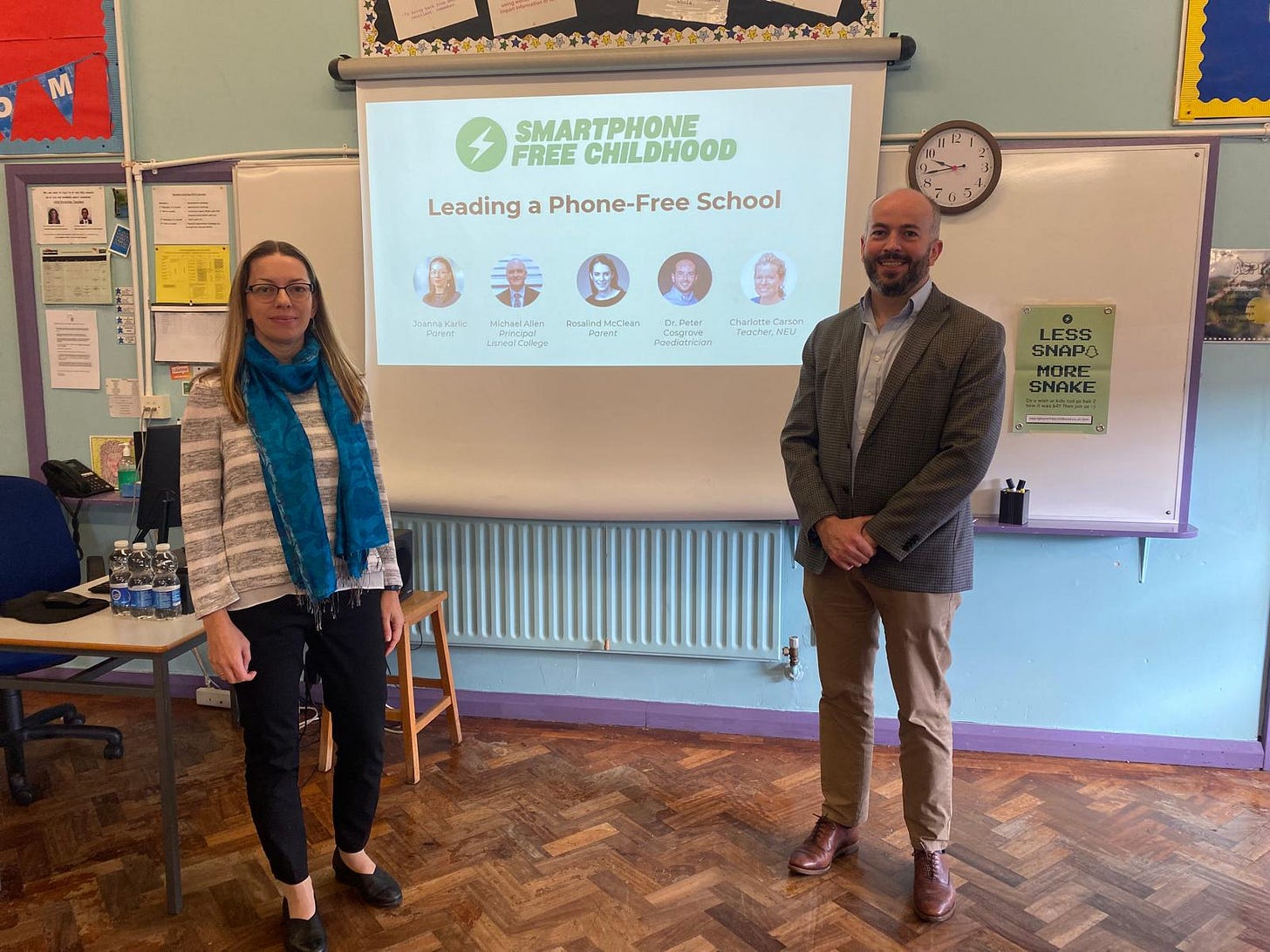Dear SfS friends and colleagues,
Happy half term.
I write from darkling England and thought I would indulge in some Virtual Reality travel by carrying out a whistle-stop tour of other countries and their schools’ smartphone policies.
What should they know of England who only England know etc; I certainly find that the survey makes the UK look sluggish if not retrograde compared with countries both neighbouring and far-flung.
Enjoy!
Will
Parentkind’s National Survey
But first, before departure, more bleakness and grimness from Parentkind’s excellent recently published National Parent Survey.
Well done to Frank and Jason for their continued work championing parents’ voices on these and related questions, and giving us such a clear picture of the way UK children are using / being used by their smartphones.
Almost a third (31%) of older teenagers say they are exposed to ‘sexist, racist or homophobic opinions’ at least once or twice a month, and nearly one in five older teenagers (17%) say they receive ‘extremely violent or gory images’ at least once or twice a month.
A third (35%) of older teenagers have been sent a sexual image or message by a stranger, with girls twice as likely to receive unwanted sexual advances than boys (47% v 23%).
Most older teenagers (58%) have never had controls put on their phone by parents to limit access to what they can view online. Even when controls are put in place, almost half (47% of those with controls imposed) said they had bypassed them.
Four in ten older teenagers (42%) admit that their smartphone is distracting them from school work ‘most weeks,’ with a similar number (43%) saying ‘social media has distracted me from school work enough to impact my grades.’
45% of older teenagers say they stay awake beyond midnight looking at their smartphone ‘most weeks.’
Two-thirds (67%) of older teenagers agree that smartphones are harmful, while three-quarters of older teenagers (74%) believe that social media is harmful.
—
To complete this merry picture, add in this week’s updates from the Online Safety Act Network:
The latest figures from the IWF show a significant increase in extreme AI-generated child sexual abuse imagery and its availability on the open web; C4 News reported on the organisation’s findings.
Internet Matters has produced new research on children’s experience of deepfakes.
World Tour
Intro
Manos Antoninis, director of UNESCO’s Global Education Monitoring Report, is one of the most authoritative voices who has been looking at the global picture.
Citing data for 2023, Antoninis said almost a quarter of all countries – 24% – had introduced some sort of policies or legislation on the issue by last year. The recommendation to do so from UNESCO itself is cited by many ministers when providing a rationale for the move.
Several European Union member states, including France, Sweden, the Netherlands, Italy, Slovakia, and Romania have already taken decisive steps to remove mobile phones from schools. In France, the use of mobile phones during classes has been banned since 2010, and since 2018, they are also prohibited during breaks and meal times. Sweden opted for mobile-free schools due to deteriorating PISA results.
Steps have been taken to curb the use of phones in schools in countries such as Nigeria, Brazil, Cambodia, Egypt, South Korea and New Zealand.
There are no official bans in Poland, Germany, Denmark, Switzerland, and Croatia, but schools have the choice to take individual measures, which many have done.
There is of course plenty of individual nuance and experimentation. For instance, Portugal is experimenting with a compromise by introducing a number of phone-free days at schools each month, while in Spain schools in some autonomous regions have imposed a ban but there is no nationwide prohibition.
Ireland
Ireland is the only country I’ve come across so far that has moved to invest (9M Euros) for every child to have their own pouch.
A fantastic initiative. Would that England do the same!
Hungary
From September 2024, smartphones in Hungarian schools have to be put into lockers and are returned after all classes have ended.
The ban was passed by the Hungarian parliament this year and came into force at the start of the school term “as part of an effort to minimise distractions for students”.
Last month, people took to the streets of Budapest to protest against the dismissal of a principal who refused to implement a smartphone ban!
Northern Ireland
Northern Ireland has gone further than England in its new guidance published last month:
Education Minister, Paul Givan, has today issued new guidance to support school leaders in restricting the personal use of mobile phones throughout the school day, including at break and lunch times.
Of special note - and commendation - is Mr Givan’s delicate rolling out of the initiative via use of a pilot:
The new guidance will be accompanied by a pilot of phone free solutions, which prevent pupils from using their phones during the school day. These are a pocket-sized fabric pouch with a magnetic latch that is sealed at the beginning of the school day and opened using a special unlocking base. The Department will invite expressions of interest for the pilot from schools over the next number of weeks.
Read to the end of this week’s edition to see a special report from our colleagues at SFC Northern Ireland!
Italy
Italy’s new policy is a step in the right direction but looks a little underwhelming, seeming to focus most of its efforts on primary.
The announcement was made by Education Minister Giuseppe Valditara on Wednesday, marking a significant shift in the country’s approach to technology in classrooms.
The new policy will apply from primary levels through to junior high school (scuola media), while the use of tablets and computers will still be permitted, provided they are used under the direct guidance of a teacher, Valditara specified.
“I don’t believe that good teaching can be done with a cell phone until middle school,” Valditara stated at an education conference in Rome. He described the restriction as “an important step forward” to restore teacher authority and to combat issues such as bullying and violence.
Australia
South Australia have now marked a year since going phone-free. Here’s what they report:
School reporting data from the state indicates a 63 per cent decline in "critical incidents involving social media" in the first half of this year compared to the same period in 2023 before the ban.
The government also says there's been a 54 per cent drop in behavioural issues, 44 per cent fewer "policy compliance issues" and 10 per cent fewer violent incidents.
And when the ban began, principals reported "immediate changes" in student behaviour, according to authorities.
Netherlands
Cell phones, smart watches, and tablets are now banned for pupils at Dutch primary and secondary schools. The Dutch government called them a "distraction" that reduces academic performance and social interaction.
Measures came into effect this September saw all primary and secondary school students prevented from bringing their phones into school in the first place.
We like measures that remove smartphones from the school premises entirely!
Belgium
Smartphones are banned across primary and secondary schools in the French-speaking regions, though a high level look at the policy suggests that children may keep their phones on them if they are in bags or pockets - a policy we know is fraught with problems.
USA
Anyone who has been reading this newsletter over the months will know the importance of the US - and Jonathan Haidt in particular - to the smartphone discourse. We also know it’s an issue that will typically be left to individual states to decide.
Here’s a useful interview with Johns Hopkins University on the evidence for smartphone bans in school:
Q: How does student cell phone use in classrooms affect teachers? What are you hearing from administrators and teachers and seeing firsthand in schools?
Anderson: So many educators have told me they’re unable to do the jobs they’re called to do because of the constant disruptions. Whether students have earbuds or headphones, they’re distracted. As a society, we’re losing our capacity to say that the time spent at school is sacred for learning because we’ve disrupted it with constant images, sounds, and actions that detract and distract from the day-to-day mission of instruction.
France
France is piloting a ban on mobile phones in schools called the "digital pause". The trial began in the 2024 school year and is being implemented in nearly 200 middle schools. The goal is to reduce the amount of time children spend on screens, which the government believes can negatively impact their development.
The trial differs from the previous law, which only prohibited the use of phones during school hours. In the trial, students must give up their phones when they arrive at school and keep them locked away for the entire day, including during recess. The plan is to enforce the ban nationwide starting in January 2025.
This new trial affects more than 50,000 students. According to France24, it is part of the government’s effort to improve school climate; reduce instances of violence, including online harassment and dissemination of violent images; improve student performance by boosting the ability to concentrate and acquire knowledge; and raise students’ awareness of the “rational use of digital tools.”
Greece
Students at schools in Greece are required to keep their mobile phones inside their bags at all times during lessons.
The new regulations and system of penalties are an extension of rules announced by Education Minister Kyriakos Pierrakakis in March which saw students face expulsion for filming classmates and ridiculing them online, in a bid to clamp down on cyberbullying.
"Students can bring their mobile phones to school, but they must keep them inside their school bags during the entire school day," Mitsotakis said in Athens on Saturday as he announced the ‘Cellphone in the School Bag’ campaign.
Again, not holding my breath on a huge impact with this one..
Norway
Not strictly related to schools, but as
reported this week,Norway Plans to Raise Social Media Minimum Age to 15 (LINK)
Norway has announced that it will be raising the minimum age to use social media from 13 to 15. The Scandinavian country says it is cracking down on tech companies that are “pitted against small brains” and trying to protect children from “the power of the algorithm.”
The changes have yet to be explained in detail, but it looks like Norway will amend its Personal Data Act so that any users of social media platforms will have to be 15 to consent to have their data collected, and there will some form of age verification required to do so. This will prevent kids from simply clicking through, claiming to be older than they are, but this may be tricky to implement.
Report from SFC Northern Ireland
Massive congratulations to Joanna, Rosalind and their team at SFC Northern Ireland for a great showing at ResearchEd recently.
Below is their report:
SFC Northern Ireland at ResearchEd Conference
Our SFC Northern Ireland regional leaders group presented at the ResearchEd conference, held at Carrickfergus Grammar school on Sat 28 Sept. ResearchEd is a big evidence based conference which is hosted in various locations across the world and it was first time it has come to Northern Ireland. The goal of researchED is to bridge the gap between research and practice in education. Researchers, teachers, and policy makers come together for a day of information-sharing and myth-busting.
SFC NI held a session on "Leading Smartphone Free Schools" at which the team gave various perspectives on the issue:
● Joanna Karlic (SFC NI regional leader) introduced SFC and gave a bit of background on how the movement came about.
● Michael Allen, principal of Lisneal College, Derry was the key speaker, and he spoke about his journey of making his school smartphone free. His presentation is summarised below.
● Rosalind McClean (SFC NI regional leader) presented the primary school parent perspective and spoke about the local pact success so far.
● Dr. Peter Cosgrove (paediatrician in emergency medicine) shared data on children’s mental health globally and in NI, and spoke about his experiences working on the front line of emergency medicine.
● Charlotte Carson (teacher and education union activist) concluded with the realities in the classroom and a call to action to those in the room.
—
Tackling the Smartphone Epidemic in Schools: A Principal’s Journey to a Healthier Learning Environment - Michael Allen, Lisneal College, Derry
Smartphones didn’t become a problem overnight; their presence in schools gradually snowballed over several years. Initially, phones were a minor topic of conversation in Senior Leadership Meetings, but soon enough, they became a recurring issue. It became clear that the cons of allowing smartphones in school far outweighed any perceived benefits.
The concerns about smartphones boiled down to three key issues:
1. Safety and Well-being of Students
Student safety is a top priority. Just as strangers aren't allowed to walk through the school gates unchecked, smartphones were essentially enabling virtual strangers to enter classrooms every day. Through social media, messaging apps, and games, external influences constantly penetrated students' lives during school hours, often in harmful ways.
2. School Management and Behavioural Issues
Phones weren’t just distractions; they were creating significant behavior management challenges. Toilets, of all places, had become social hubs. Students would coordinate meet-ups via text during class, leading to large congregations in the bathrooms. The situation escalated to the point where even parents began raising concerns, highlighting how pervasive the issue had become.
3. Learning and Classroom Disruption
The disruptions caused by smartphones were relentless. Students were glued to their phones, constantly sneaking glances under their desks or feigning the need to use the restroom just to check their messages. Imagine driving and feeling your phone buzz — the temptation to check it is overwhelming, even though you know you shouldn’t. This was the same scenario playing out for students in classrooms, lesson after lesson. In one instance, a confiscated phone buzzed 73 times in a single day. That’s an average of eight notifications per lesson! For students experiencing bullying, these constant notifications were a source of ongoing anxiety and worry, pulling their concentration away from their lessons.
It became undeniable: the negative impact of smartphones far outweighed the positives. A change was necessary.
The School's Approach to Solving the Problem
The principal acknowledged that every school is unique, and not every solution will fit every school. This school addressed the issue by banning the use of phones during the school day. However, the implementation required a practical system to ensure the policy’s smooth execution. A chaotic end-of-day scene with hundreds of students lining up to collect their phones was not an option, so a new process was devised.
Students dropped off their phones with their form tutors at the start of the day and collected them from the same tutor at the end. This required some adjustments to the school schedule but proved to be a worthwhile change.
The school piloted the program with Year 8 students, engaging parents in discussions beforehand. The response was largely positive, with most parents supporting the initiative. The pilot ran smoothly, and over the following months, the policy expanded to Year 9, Year 10, and so on. While the initial resistance was minimal, Year 12 posed a challenge—they were unhappy and initially refused to comply. However, when the principal suggested that non-compliance could result in missing their end-of-year formal, the students quickly reconsidered!
Staff members were also included in the policy, with no phones allowed in the presence of students as a way of setting a good example.
The Transformation: Day and Night
The transformation within the school has been remarkable. Lunchtimes, once dominated by students staring at screens, are now filled with vibrant conversations and active play. Students are engaging with one another, playing sports, and participating in activities rather than sitting in silence, engrossed in their phones. The difference is striking.
Teachers have also observed noticeable improvements in classroom energy and focus. With phones out of the equation, students are more present, engaged, and less anxious.
Of course, there were some challenges raised along the way, but the school tackles them one by one. For example, some teachers expressed concern about being held responsible for any lost or damaged phones, so the principal reassured them that he would take on personal responsibility for such incidents.
In a recent bus duty—one of the few places where students are still allowed to use their phones—the principal observed students glued to their screens, a stark reminder of how far the school has come during regular school hours.
Conclusion
Implementing a phone-free school day has proven to be one of the most impactful changes this school has made in recent years. Though not without its challenges, the results have been overwhelmingly positive. Students are happier, classrooms are more focused, and the entire school community feels healthier and more connected. While this approach may not work for every school, for this one, it has been a true game-changer.
To listen
To end, here is an audio survey on US schools that have gone phone-free:








